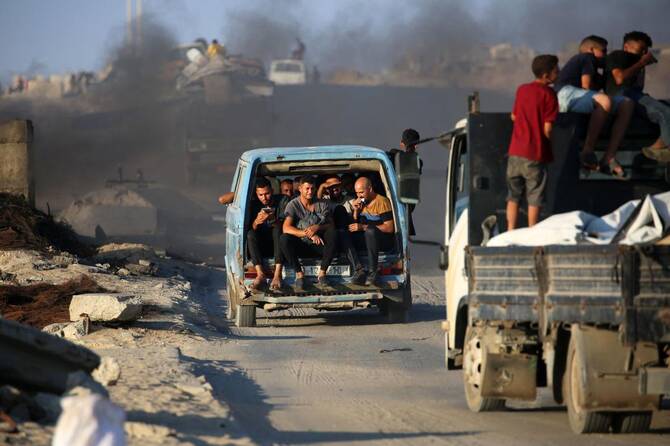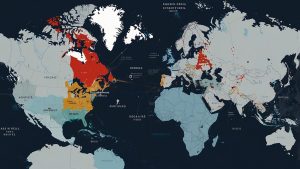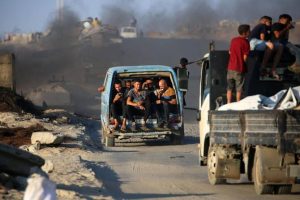US first step to authorize emergency aid to Afghanistan

When a natural disaster strikes, the world typically rallies around the affected country. Humanitarian aid flows across borders, emergency supplies are dispatched, and international organizations coordinate efforts to save lives and restore basic services. Yet nearly a week after a devastating earthquake struck Afghanistan, killing more than 2,200 people and displacing tens of thousands, the United States — historically one of the largest donors in global humanitarian relief — has remained silent on concrete action.
According to sources familiar with internal discussions, the Biden administration’s State Department has yet to approve a formal declaration of humanitarian need, a procedural but essential first step in releasing US emergency aid. The delay, experts argue, underscores how Washington’s shifting foreign aid policies — including the controversial decision by former President Donald Trump to close the US Agency for International Development (USAID) earlier this year — have undermined America’s decades-long leadership in disaster response.This hesitation comes at a time when Afghanistan’s population is grappling not only with the aftermath of one of the deadliest earthquakes in its modern history but also with widespread poverty, hunger, and political isolation under Taliban rule. The silence from Washington has prompted a flurry of criticism from former officials, humanitarian leaders, and international observers, who see inaction as a dangerous precedent.
The Quake and Its Aftermath
The earthquake, registering a magnitude of 6.0, struck southern Afghanistan on Sunday. Tremors reverberated across neighboring provinces, flattening villages built with mud-brick homes and triggering landslides that buried entire families. Powerful aftershocks followed on Thursday and Friday, further destabilizing weakened structures and deepening the sense of fear among survivors.
Rescue operations have been hampered by Afghanistan’s rugged terrain, poor infrastructure, and the limited capacity of emergency services under Taliban governance. According to local authorities and UN reports, at least 2,200 people are confirmed dead, with the toll expected to rise as remote areas become accessible. Tens of thousands have been rendered homeless, forced to sleep under the open sky amid dropping nighttime temperatures.
“Beyond the loss of life, we have also seen basic infrastructure and livelihoods destroyed,” said Stephen Rodriguez, the UN Development Programme’s representative in Afghanistan. Schools, clinics, and marketplaces have collapsed, leaving communities without essential services. In many places, roads remain blocked, cutting off survivors from outside assistance.
A Missing US Response
In most global disasters, the United States is among the first countries to step forward, often announcing aid packages within 24 hours. This time, however, Washington’s response has been limited to a brief post on X (formerly Twitter), in which the State Department expressed “heartfelt condolences” to the Afghan people.Behind the scenes, officials within the State Department and the White House reportedly discussed the possibility of providing disaster assistance but chose not to act. A declaration of humanitarian need — the bureaucratic green light for releasing emergency funds — has not been approved. According to former USAID officials, such a declaration is normally routine and swift, reflecting Washington’s long-standing commitment to disaster relief.
“The fact that nothing has been signed almost a week later is extraordinary,” said one former senior official familiar with the process. “It signals a deliberate decision to withhold aid, not just bureaucratic delay.”
The Trump Factor
Observers link Washington’s inaction directly to policy shifts introduced under Donald Trump. Earlier this year, the Trump administration officially shut down USAID, the government’s primary foreign assistance agency, citing inefficiency and misuse of funds. For decades, USAID had played a central role in responding to natural disasters, coordinating logistics, funding humanitarian organizations, and mobilizing rapid-response teams.
“By closing USAID, President Trump dismantled the very machinery that allowed the United States to project soft power and moral leadership in times of crisis,” said Kelly Razzouk, vice president of policy and advocacy for the International Rescue Committee (IRC). “Now, when disaster strikes, Washington is paralyzed.”In April, the administration also ended virtually all aid to Afghanistan — totaling $562 million — after a US watchdog report revealed that humanitarian groups had paid nearly $11 million in taxes and fees to the Taliban. Trump defended the cuts as necessary to prevent American taxpayer dollars from indirectly funding a regime that continues to detain US citizens and impose repressive policies on Afghan women and minorities.While this policy might align with Washington’s strategic goals, critics argue it has come at the expense of ordinary Afghans caught in crises beyond their control.
International Response
The contrast between Washington’s hesitation and the swift action of other nations is stark. Countries including Britain, South Korea, Australia, India, Pakistan, Iran, and Turkiye have already dispatched money, supplies, or rescue teams.“Far more is needed, but at least others have stepped up,” said Rodriguez of the UNDP. “The United States’ absence is particularly notable given its historic role in Afghanistan and the scale of its past humanitarian contributions.”United Nations aid chief Tom Fletcher warned that the earthquake highlights the “cost of shrinking resources on vital humanitarian work.” Already, massive funding cuts have halted essential health and nutrition services for millions of Afghans, grounded aircraft that serve as lifelines to remote communities, and forced aid agencies to reduce operations.
Stuck in Storage
The International Rescue Committee has faced its own challenges in navigating Washington’s restrictions. According to Razzouk, the IRC has $105,000 worth of US-funded medical supplies — including stethoscopes, stretchers, and first aid kits — that cannot be dispatched to Afghanistan without government approval.“The stocks are stuck in storage,” Razzouk said. “In recent memory, I can’t remember a time when the US did not respond to a crisis like this.”The supplies were purchased through an unrelated US grant that was later canceled as part of the administration’s broader aid freeze. Without authorization, the materials remain in warehouses even as survivors in Afghanistan lack the most basic medical support.
The Politics of Aid
At the heart of Washington’s reluctance lies a thorny question: how to deliver aid to ordinary Afghans without benefiting the Taliban regime. Since seizing power in 2021, the Taliban has imposed strict social restrictions, curtailed women’s rights, and maintained a hostile relationship with the West. The group’s refusal to form an inclusive government or adhere to international norms has left it largely isolated.
“President Trump has been consistent in ensuring aid does not land in the hands of the Taliban,” a White House official said. “This is about protecting American interests and preventing the legitimization of a regime that continues to hold US citizens hostage.”
Yet humanitarian groups counter that aid can be delivered through neutral channels, as has been done in other crisis zones under authoritarian regimes. The UN and NGOs have long developed mechanisms to ensure resources reach communities directly, bypassing government structures.
“Punishing civilians for the actions of their rulers is both morally wrong and strategically short-sighted,” said one former USAID director. “If the US withdraws from humanitarian leadership, other powers — including China, Russia, and regional players — will fill the vacuum.”
The Human Toll
In the makeshift camps set up in quake-hit provinces, survivors face grim conditions. Families huddle under plastic sheets or makeshift tents, struggling against cold nights. Children cry from hunger as food supplies dwindle. Health workers warn of disease outbreaks as sanitation collapses.
Local testimonies reveal desperation. “We lost everything,” said Abdul Rahman, a farmer from Paktika province who buried his wife and two children after their home collapsed. “We don’t care about politics. We need food, water, and shelter.”
Women, already marginalized under Taliban rule, face particular hardship. With schools and clinics destroyed, many lack access to maternal care and basic hygiene. Aid agencies warn that without rapid intervention, secondary deaths from hunger, exposure, and preventable disease could rival or surpass the quake’s immediate toll.
A Legacy of War and Withdrawal
The US reluctance to assist Afghanistan is shaped by the bitter legacy of a 20-year war that ended in 2021 with a chaotic withdrawal and the Taliban’s return to power. During that conflict, the United States poured billions into Afghanistan, funding infrastructure, governance programs, and humanitarian projects. Yet much of that investment collapsed with the fall of Kabul, leaving Washington wary of reengaging.
“Afghanistan is seen in Washington as a sunk cost,” said one analyst. “There is little political appetite to revisit a place associated with so much blood and treasure, especially when the ruling regime is hostile.”
Still, critics argue that humanitarian aid should be separated from geopolitics. “The Afghan people are not the Taliban,” said Razzouk. “By withholding aid, the US is abandoning millions who had no say in their government’s policies.”
The Global Image of America
Beyond Afghanistan, Washington’s silence raises broader questions about America’s role in the world. For decades, US disaster relief was a hallmark of its soft power, showcasing generosity and reinforcing alliances. Whether responding to earthquakes in Haiti, tsunamis in Asia, or hurricanes in the Caribbean, American aid often arrived first and at scale.
Now, with USAID dismantled and foreign aid budgets slashed, that reputation is under threat. “This is not just about Afghanistan,” said Tom Fletcher of the UN. “It’s about whether the world can still rely on the United States in moments of crisis.”
If Washington retreats, humanitarian leadership may shift to other powers. China has already increased its footprint in global development through its Belt and Road Initiative, while regional players like Turkiye and Iran are using humanitarian diplomacy to expand influence.
What Happens Next?
As of Friday, the White House insists it has “nothing further to announce.” Behind the scenes, pressure is mounting from former officials, NGOs, and international partners for Washington to reconsider. Some propose narrowly tailored aid packages delivered exclusively through UN agencies, ensuring no funds pass through Taliban hands. Others advocate for releasing blocked supplies like those held by the IRC as an immediate goodwill gesture.
The coming weeks will reveal whether the United States maintains its hard line or finds a compromise that balances strategic concerns with humanitarian imperatives. For quake survivors in Afghanistan, however, time is running out. Each day without aid increases the risk of disease, hunger, and further loss of life.
Conclusion
Nearly a week after disaster struck Afghanistan, the absence of a US aid response reflects more than bureaucratic delay. It illustrates a profound shift in America’s global posture: away from humanitarian leadership and toward a narrower, security-driven foreign policy.
The earthquake’s victims — ordinary Afghans who have endured decades of war, poverty, and instability — now face the added burden of global indifference. Whether Washington chooses to act could determine not only their survival but also the credibility of America’s claim to moral leadership in the world.
As Kelly Razzouk put it: “In recent memory, I can’t recall a crisis where the US did not respond. If this is the new normal, it is a dangerous one.”





